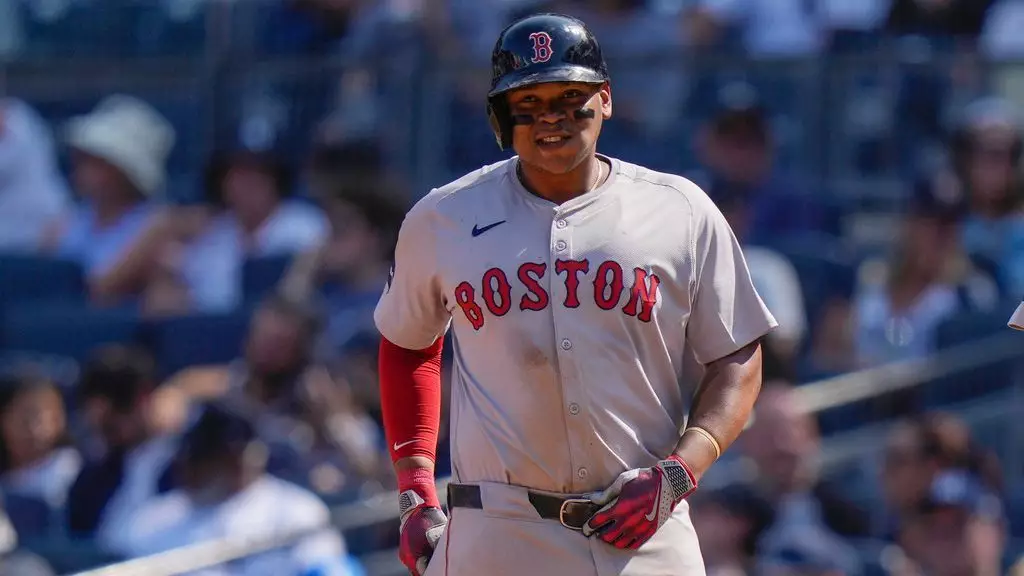In the realm of Major League Baseball, the role of a designated hitter (DH) is often perceived as one of flexibility within a rigid design. For Rafael Devers, however, such flexibility comes with boundaries. After the Boston Red Sox faced significant loss with the injury of first baseman Triston Casas, Devers found himself at a crossroads. Rather than view this as an opportunity to expand his versatility, Devers firmly asserted his commitment to the DH role. This stance speaks volumes, not only about Devers’ personal conviction but also about the shifting dynamics within the Red Sox organization.
Devers, a three-time All-Star, recently shared his perspective on the team’s request for him to assume first base responsibilities. He candidly expressed his reluctance to juggle yet another position switch, especially after a well-publicized transition from third base to DH in response to the signing of Alex Bregman. His response to reporters embodies a blend of confidence and clarity; he recognizes his expertise and preferences while also respecting the realities of the game.
Understanding the Importance of Specialization
In a sport where specialization can make or break a player’s effectiveness, Devers’ reluctance to shift positions highlights an insightful point: the importance of mastering one role over attempting to fulfill multiple needs. Devers emphasized that while he acknowledges the Red Sox view him as an athlete capable of adaptation, his core commitment should remain clear. The player-coach relationship is intricate; Devers respectfully pushed back against what he perceived as an unrealistic expectation, advocating instead for a focused and consistent role.
“What they seem to forget,” he noted, “is that constant movement across positions can disrupt a player’s performance.” His observations echo a broader sentiment among players who often feel pressure to adapt to organization needs rather than concentrate on refining their skills. The competitive nature of sports demands excellence, and Devers believes that remaining in the DH role allows him to contribute at his highest potential.
The Role of Communication in Team Dynamics
Devers’ dialogue with Red Sox chief baseball officer Craig Breslow reveals much about the communication channels within the organization. He voiced that changing positions isn’t just a simple task; it requires an understanding of player psychology and readiness. It’s an implicit reminder that effective communication is foundational in sports management; Breslow’s previous experience as a player should ideally facilitate more nuanced discussions about these transitions.
As Devers articulates, “They put me in this situation. They told me they didn’t want me to play any other positions.” This trust, which Devers feels has been compromised, stresses the need for organizations to honor their commitments to players. Positive reinforcement and clear expectations can cultivate a more constructive atmosphere–one that partners management’s objectives with player aspirations.
A Call for Strategic Resource Allocation
Interestingly, Devers also suggested a proactive approach from the Red Sox regarding the current gap at first base. Rather than tapping into his expertise at DH, he encouraged the management to explore external options to fill the void left by Casas. This recommendation not only demonstrates Devers’ respect for his role but also indicates a strategic insight that could benefit the Red Sox in the long run.
“Now, they should do their jobs essentially and hit the market and look for another player,” he argued. Such a perspective reveals a maturity uncommon among athletes in his position–one that places the team’s overall success above personal ambition. Devers is essentially advocating for a collaborative approach centered on long-term planning rather than short-term fixes.
Personal Integrity Against Team Expectations
Throughout his interactions with the media, Devers exuded an unwavering sense of self-awareness and integrity. His assertion of being “hard-headed” is interesting; it showcases a player secure in his identity as a specialized hitter. Such conviction is refreshing; it serves as a reminder that athletes can (and should) express their boundaries clearly. Devers’ determination not to acquiesce to the pressures of positional play underscores a critical facet of professional sports: athletes are not merely cogs in an organizational machine but rather multifaceted individuals deserving of respect.
The conversation surrounding Rafael Devers transcends baseball mechanics; it delves into the dynamics of player autonomy, the importance of specialized roles in a team framework, and the need for organizations to foster transparent dialogue. His firm stance not only safeguards his career but also sheds light on broader issues of player treatment and agency within professional sports.
By standing his ground, Devers has opened a dialogue about the importance of recognizing a player’s limits and the necessity of keeping commitments within the team structure. In the end, his journey as a designated hitter may inspire many athletes to prioritize their strengths and uphold their values amidst the complexities of the sporting world.

